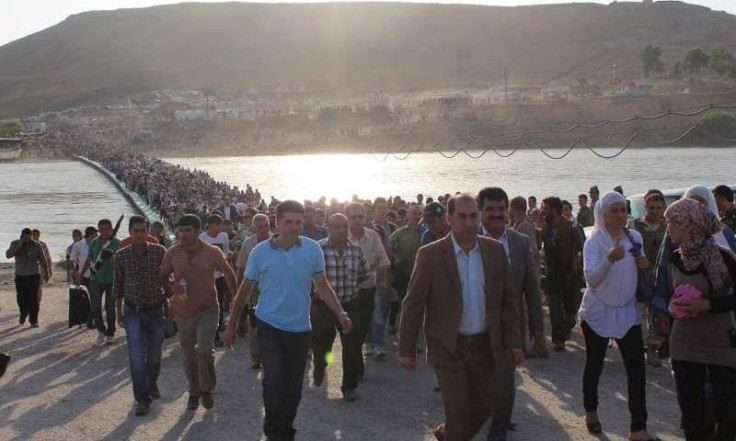Tens of Thousands of Syrians Flee over Pontoon Bridge into Iraqi Kurdistan

Tens of thousands of Syrian refugees are fleeing into Iraq in one of the largest waves of migrants since the conflict began more than two years ago, according to the UN High Commissioner for Refugees.
Up to 10,000 Syrians used a reconstructed pontoon bridge to cross the Tigris into Iraqi Kurdistan at Peshkhabour on Saturday, after an estimated 7,000 made the crossing on Thursday.
What caused the sudden exodus remains unclear, said the UNHCR, but it followed a sharp rise in clashes between Syrian Kurds and anti-government Islamist militants in recent weeks .
"The factors allowing this sudden movement are not fully clear to us at this stage," said UNHCR spokesman Adrian Edwards.
The charity Save the Children launched an emergency response to the tide of refugees.
"This is an unprecedented influx of refugees, and the main concern is that so many of them are stuck out in the open at the border or in emergency reception areas with limited, if any, access to basic services," said the charity's emergency team leader, Alan Paul.
"The refugee response in Iraq is already thinly stretched, and close to half of the refugees are children who have experienced things no child should."
Many of the new arrivals were exhausted and in need of food, water and medical attention, he said.
UNHCR field staff reported an initial group of about 750 Syrians crossing over the pontoon bridge at Peshkhabour just before noon on Thursday. That afternoon, a much larger group of up to 7,000 refugees followed them.
The sheer numbers pouring over the border left UN agencies and the Kurdish regional government struggling to cope.
Most were families fleeing from a broad stretch of territory in northern Syria, including Aleppo, Hassakeh, Qamishli and other war-torn areas.
One refugee, Abdulkarim Brendar, told of making the pontoon crossing with his five children after war and looting had left them "without a morcel" of food.
Another, Ahmed Karim, told UNHCR staff he fled Syria to save his family from starvation.
"There was a shortage of food in the market, and everything became expensive, from bread to gas canisters, and unemployment was spreading," he said.
More than 150,000 Syrian refugees have been registered in Iraq, of the two million who are believed to have fled the country since the conflict began in March 2011.
The UN said it was working with the Iraqi Kurdistan government and other agencies to establish a camp at Darashakran, which Edwards said would open within two weeks.
Kurds make up about 10% of the Syrian population. Iraqi Kurdistan comprises three provinces in northern Iraq, with their own governing council, militia and police force.
Dozens have been killed in fighting between Kurdish militias in Syria and jihadists from the al-Nusra Front fighting the regime of Bashar al-Assad.
The developments came as UN chemical weapons inspectors landed in Damascus ahead of their two-week visit to three sites, including one in the northern town of Khan al-Assal which is the focus of chemical weapons investigations.
© Copyright IBTimes 2025. All rights reserved.





















